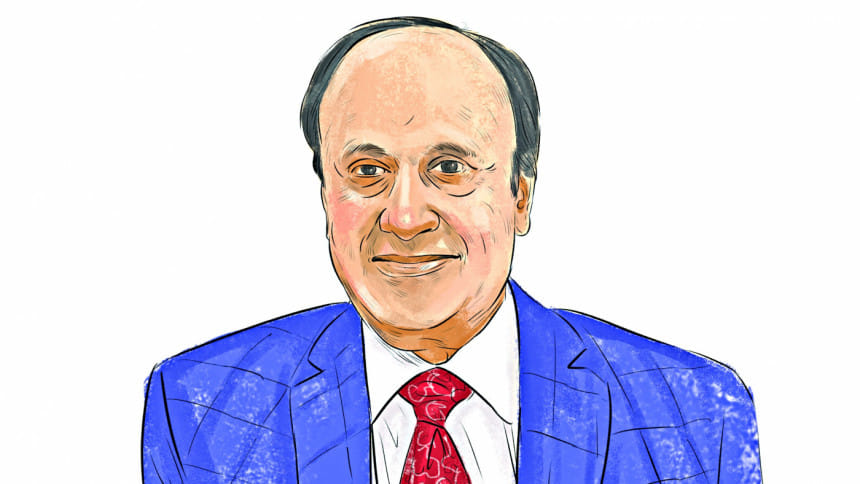Priorities that should top new govt’s to-do list

Restoring macroeconomic stability, resuming the growth momentum and helping the poor should be the fundamental focus of economic reforms for the new government, said Sadiq Ahmed, vice-chairman of the Policy Research Institute of Bangladesh.
"In order to restore macroeconomic stability, a combination of flexible management of the exchange rate, tightening of credit growth and a judicious use of tax and expenditure measures are required."
"This is the most fundamental reform challenge facing the new government."
Associated reforms include adopting a uniform and market-based exchange rate, strengthening the flexibility of the interest rate by targeting the desired inflation rate, and allowing the interest rate to rise in the short term until demand for credit has fallen adequately to achieve the target inflation rate.
In an interview with The Daily Star recently, Ahmed said the government should reduce the fiscal deficit by raising public revenues through a comprehensive tax reform that overhauls the present primitive and discretionary tax system to a modern and rules-based taxation system.
Similarly, it should sharply strengthen the financial performance of the state-owned enterprises through corporate governance and pricing policy reforms.
The prevailing macroeconomic instability has hurt growth, with most of the growth drivers, including private investment, public investment and exports adversely affected.
"Additionally, the government's policy response based on import controls has further weakened the growth momentum."
According to the World Bank, Bangladesh's economy is forecast to slow to 5.6 percent in the current financial year. This would be the lowest GDP growth in more than a decade if the Covid-hit 2019-2020 is excluded.
The former economist of the World Bank thinks the resumption of private investment expansion will benefit from the restoration of macroeconomic stability.
"But it will also require steps to reduce the cost of doing business through further deregulation of the investment climate, reducing the corporate tax rates, simplifying tax compliance procedures, and improving access to electricity and primary energy."
According to Ahmed, the implementation of the Eighth Five-Year Plan's fiscal policy framework is essential to restore the growth momentum to the Perspective Plan 2041 growth path.
Among other fiscal reforms, the framework calls for the tax-to-GDP ratio to grow from 8 percent of GDP in 2019-20 to 12 percent by 2024-25.
"Bangladesh is way, way behind on this. This ought to be a top policy priority," Ahmed said.
"Fiscal reforms will help reduce fiscal deficits while increasing public savings. These savings can be used to increase the public investment rate focused on infrastructure development and human capital."
Alongside, strong and effective financial intermediation is necessary to support the growth of national savings and private investment.
He says the mobilisation of bank deposits and reduction in non-performing loans (NPLs) will release the resources needed to finance working capital and private investment at reasonable interest rates.
"Strong efforts are needed to implement an export diversification strategy to provide the backbone for manufacturing growth and employment."
The export diversification agenda involves the institution of a market-based exchange rate, a sharp reduction in trade tariffs, including streamlining of all para-tariffs with a view to substantially reducing the anti-export bias of trade policy, and providing all RMG facilities to non-RMG exports.
Other initiatives should include lowering the cost of trade logistics through deregulation, port upgrading, and management improvements, participating in free trade agreements, participating in global value-chain arrangements, upgrading technology, research and development and labour skills, and substantial promotion of foreign direct investments by sharply improving the investment climate
The PRI vice-chairman said the surge in inflation has hurt the poor and the vulnerable section of the population and they need urgent relief.
Owing to budget cuts, a mere 0.8 percent of GDP is currently spent on social protection programmes for the poor if civil service pensions, which are not poverty-focused assistance, are excluded.
"Efforts must be made to increase income transfers to the poor by at least another 0.5 percent of GDP over the next 12-18 months."
He said the implementation of the National Social Security Strategy (NSSS) approved in 2015 is off track, so concerted initiatives are needed to bring it back on track in its entirety.
"It is also necessary to initiate the implementation of a universal health care programme."

 For all latest news, follow The Daily Star's Google News channel.
For all latest news, follow The Daily Star's Google News channel. 








Comments